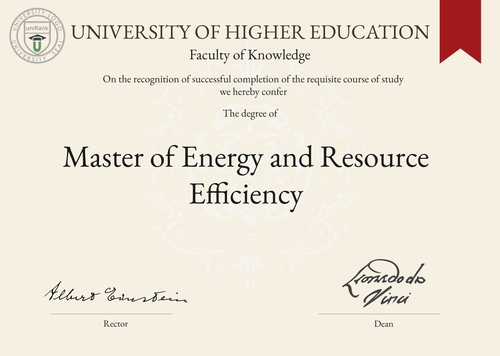
Master of Energy and Resource Efficiency (MERE)
Guide to Master of Energy and Resource Efficiency Program/Course/Degree
Master of Energy and Resource Efficiency (MERE)

Program Name:
Master of Energy and Resource EfficiencyProgram or Degree abbreviation:
MEREDuration range:
Varies by country and university, typically 1-2 yearsTuition range:
Varies by country and university, typically $10,000-$30,000 per yearOverview:
The Master of Energy and Resource Efficiency program is designed to equip students with the knowledge and skills necessary to address the growing global demand for sustainable energy and resource management. This interdisciplinary program combines elements of engineering, environmental science, economics and policy to provide a comprehensive understanding of energy efficiency, renewable energy technologies and resource conservation.Curriculum Overview by year:
Year 1: - Introduction to Energy and Resource Efficiency - Energy Systems and Technologies - Sustainable Resource Management - Energy Economics and Policy - Elective Courses Year 2: - Advanced Energy Efficiency Techniques - Renewable Energy Integration - Energy Auditing and Management - Research Project or Internship - Elective CoursesKey Components:
- Energy efficiency assessment and implementation strategies - Renewable energy technologies and their integration - Resource conservation and sustainable management practices - Energy economics and policy analysis - Research and practical experience through projects or internshipsCareer Prospects:
Graduates of the Master of Energy and Resource Efficiency program can pursue various career paths in both the public and private sectors. Potential job roles include energy consultant, sustainability manager, renewable energy project manager, policy analyst and environmental engineer. Graduates can work in industries such as energy management, consulting firms, government agencies, research institutions and non-profit organizations.Salary Expectations:
Salary expectations for graduates of the Master of Energy and Resource Efficiency program can vary depending on factors such as location, industry, job role and level of experience. On average, professionals in this field can earn a salary ranging from $50,000 to $100,000 per year. For a more accurate understanding of salary expectations, you can utilize the Job Sites Search Engine, from our sister site jobRank, which searches over 4,600 job sites worldwide. Make sure to specify not only the job title but also the country you are interested in.Conclusions:
It is important to note that the duration, tuition fees, curriculum, key components, career prospects and salary expectations of the Master of Energy and Resource Efficiency program can vary depending on the chosen country or location of study, as well as the chosen university. Prospective students are encouraged to research and compare different programs to find the best fit for their individual goals and circumstances. Visitors interested in pursuing a Master of Energy and Resource Efficiency degree can use the uniRank World Universities Search Engine to find universities offering this specific degree anywhere in the world. This search engine provides a comprehensive database of universities and their programs, allowing individuals to explore various options and make informed decisions about their education.World Universities Search Engine
search for Master of Energy and Resource Efficiency (MERE) and add the Location (country, state etc.) or specific University you are interested in studying at.
Query examples:
- Master of Energy and Resource Efficiency (MERE) United States
- Master of Energy and Resource Efficiency (MERE) United Kingdom online
- Master of Energy and Resource Efficiency (MERE) Australia international students
- Master of Energy and Resource Efficiency (MERE) University of California
- Master of Energy and Resource Efficiency (MERE) University of London tuition fees
- Master of Energy and Resource Efficiency (MERE) University of Sydney scholarships
Share Program/Course
Interesting? Share this program/course/degree info with your friends now.